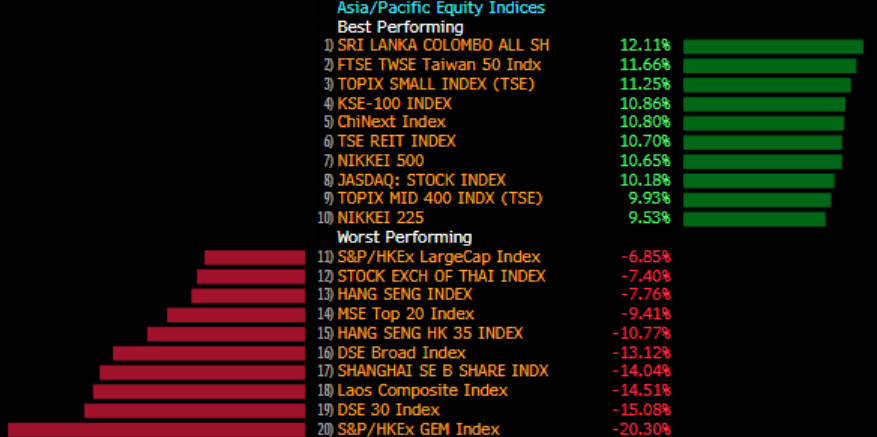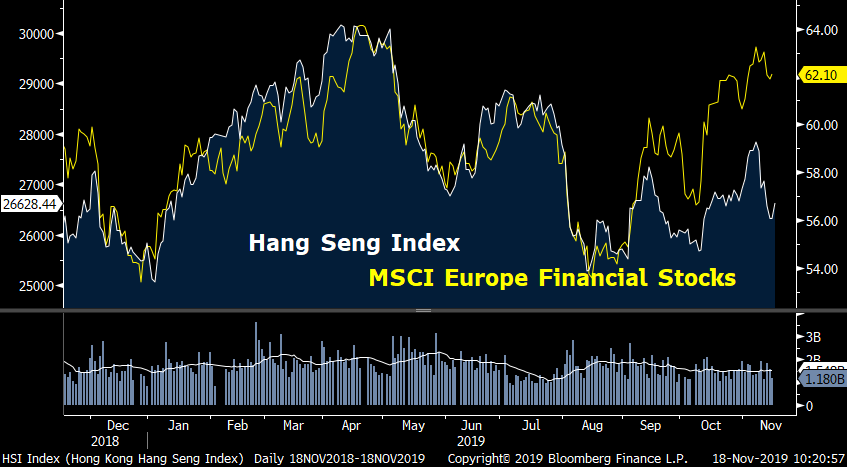Editor's Note: Jimmy Zhu is chief strategist at Fullerton Research. The article reflects the author's opinion, and not necessarily the views of CGTN.
Hong Kong stocks have dropped over 10 percent since the beginning of the second half of the year, making the market one of the worst performers in the Asia Pacific region. However, Alibaba's upcoming Hong Kong listing could support stocks in the city.
Why are Hong Kong stocks underperforming?
Financial stocks tend to underperform when global central banks cut interest rates. Lower policy rates shrink commercial banks' profits as they narrow their interest rate margin. In a negative interest rate environment, those commercial banks are paying more to the central bank to keep their excess funds.

The worst performing stocks. /Source: Bloomberg
The worst performing stocks. /Source: Bloomberg
The prolonged protests in the Special Administrative Region causing the economy to fall into recession are the major reason behind the sell-off in equities. Besides that, the global interest rate environment is also not favoring Hong Kong stocks, given almost half of listings on the Hang Seng Index belong to the financial sector. This ratio is much higher than almost all other major global indices.
Financial stocks on the EURO STOXX 50 account for 17.5 percent of total listings, and 13.2 percent for the S&P 500, 10.5 percent for the TOPIX and 34.9 percent for CSI 300. Since the beginning of the second half of the year, EURO STOXX 50 rose 6 percent, S&P 500 gained 6.5 percent, TOPIX rose 9.9 percent and CSI 300 went up 1.3 percent.
By comparing the financial stocks' weighting in these indices and their performances since early July when the global monetary stimulus accelerated, you can see that those indices with a lower percentage of financial stocks tended to outperform in the central banks' easing cycle.
Despite the Fed calling for a pause to its rate cuts, some other central banks are not going to follow that, including the European Central Bank (ECB). The new ECB chief, Christine Lagarde, is expected to act more dovish than Mario Draghi. If negative interest rates in the bloc continue due to the dovish ECB, stocks in the banking sector around the world will continue to underperform, including those on the Hang Seng. The chart below shows that the Hang Seng Index has been moving in the same direction with European financial stocks.

Hang Seng Index. /Source: Bloomberg
Hang Seng Index. /Source: Bloomberg
Moreover, the Fed's rate cut is likely to resume in 2020 when many fundamental issues remain unsolved, such as U.S.-China trade tensions and slowing global growth.
Alibaba's presence in Hong Kong is expected to change the landscape of Hong Kong stocks
Alibaba's trading in Hong Kong would trim those financial stocks' weightings on the Hang Seng in the future. Four of the top five stocks' weightings on the index are in the financial sector, which are AIA Group, HSBC Holdings, China Construction Bank and Ping An Insurance. The weightings of these four stocks account for around 33 percent of the Hang Seng Index. In other words, these financial stocks' weightings may be trimmed by the index due to Alibaba's arrival.
Tencent currently accounts for 9.6 percent of the Hang Seng Index, and its weighting in MSCI China (in U.S. dollar terms) stands at 14.8 percent, while Alibaba's weighting in MSCI China stands at 13.4 percent. It's difficult to estimate the future weighting of Alibaba on the Hang Seng in the future, but an increasingly heavy weighting towards the tech sector in the future is nearly confirmed, diminishing that of financial stocks.
Moreover, any smooth and successful listing for Alibaba in Hong Kong will likely induce more Chinese tech firms listed in the U.S. to come back home as well. U.S.-China trade tensions continue to bring uncertainty to U.S.-listed Chinese companies, and some of them may have already started looking for alternatives.
More importantly, 20 ETFs and funds that track the Hang Seng already have about 38 billion U.S. dollars of total assets under management, according to Bloomberg data. Potential large inflows into those Chinese companies' returns look likely.
The Hang Seng Index rose by as much as 1.4 percent in morning trading on Monday.